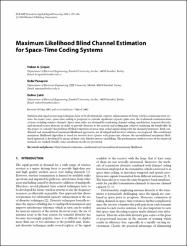Maximum likelihood blind channel estimation for space-time coding systems
Citation
Çırpan, H. A., Panayırcı, E. & Çekli, E. (2002). Maximum likelihood blind channel estimation for space-time coding systems. Eurasip Journal on Applied Signal Processing, 2002(5), 497-506. doi:10.1155/S1110865702000847Abstract
Sophisticated signal processing techniques have to be developed for capacity enhancement of future wireless communication systems, In recent years, space-time coding is proposed to provide significant capacity gains over the traditional communication systems in fading wireless channels. Space-time codes are obtained by combining channel coding, modulation, transmit diversity, and optional receive diversity in order to provide diversity at the receiver and coding gain without sacrificing the bandwidth. In this paper, we consider the problem of blind estimation of space-time coded signals along with the channel parameters. Both conditional and unconditional maximum likelihood approaches are developed and iterative solutions are proposed. The conditional maximum likelihood algorithm is based on iterative least squares with projection whereas the unconditional maximum likelihood approach is developed by means of finite state Markov process modelling. The performance analysis issues of the proposed methods are studied. Finally, some simulation results are presented.
Source
EURASIP Journal on Advances in Signal ProcessingVolume
2002Issue
5Related items
Showing items related by title, author, creator and subject.
-
Pilot-aided bayesian MMSE channel estimation for OFDM systems: Algorithm and performance analysis
Şenol, Habib; Çırpan, Hakan Ali; Panayırcı, Erdal (IEEE, 2004)This paper proposes a computationally efficient, pilot-aided minimum mean square error (MMSE) channel estimation algorithm for OFDM systems. The proposed approach employs a convenient representation of the discrete multipath ... -
Channel modeling and characterization for VLC-based MBSNs impaired by 3D user mobility
Dönmez, Barış; Miramirkhani, Farshad (IEEE, 2021-11-27)This paper focuses on channel modeling and characterization of indoor visible light communication (VLC)-based medical body sensor networks (MBSNs) which establish links between light-emitting diodes (LEDs) and MBSNs nodes ... -
Channel adaptive encoding and decoding strategies and rate regions for the three user cooperative multiple access channel
Edemen, Çağatay; Kaya, Onur (IEEE, 2008)For a cooperative Gaussian multiple access channel (MAC), we propose a new channel adaptive three user cooperation strategy, based on a non-trivial extension of block Markov super-position encoding. We obtain the expressions ...


















